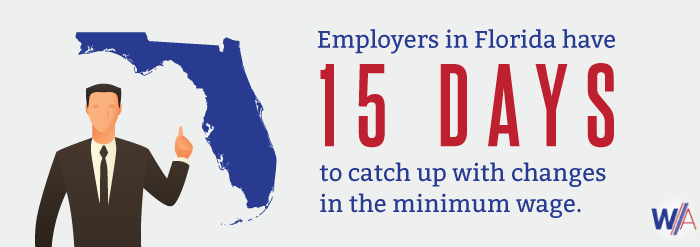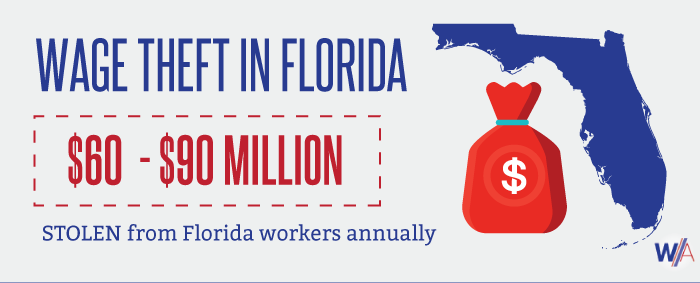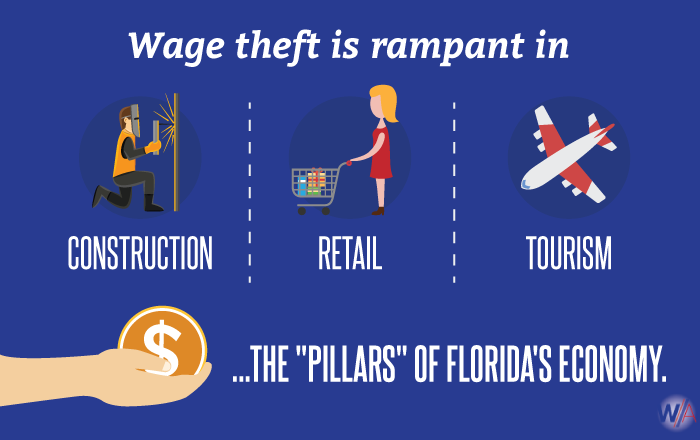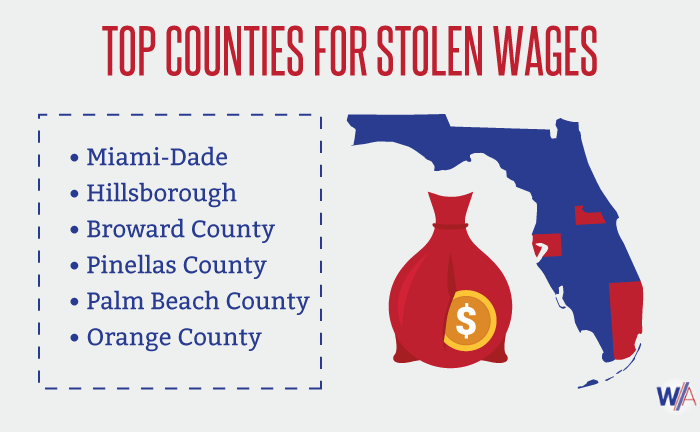Florida has a huge economy, rivaled only by California, New York and Texas as the fourth largest state economy in America. With so many profitable businesses employing so many industrious workers (9.3 million at last count, according to the Bureau of Labor Statistics), you’d expect Florida to have strong wage and hour laws, protecting the rights of workers to earn good rates and support their families. You would be wrong. Mostly wrong, at least.
Florida Minimum Wage Law
Florida doesn’t really have its own wage and hour laws, although a constitutional amendment approved by the state’s residents in 2004 takes care of the minimum wage.
Minimum Wage Rises With Inflation, CPI
While the federal minimum age remains static at $7.25 per hour, Florida’s minimum wage changes every year to keep pace with the rising cost of goods and services. This year, in 2018, Florida’s minimum wage is set at $8.25 per hour, with a tipped minimum wage no less than $5.23 per hour. That number is recalculated annually, using the Consumer Price Index (CPI), every September 30th. New numbers go into effect on January 1st of the following year, but don’t expect huge changes.
While small, these changes are important. When employers fail to take note of the new minimum wage, and keep eligible workers at the previous year’s rate, they have only 15 days to come into compliance and compensate their workers for unpaid back wages.

After those 15 days are up, the workers have every right to file a civil wage and hour lawsuit and demand double the back wages owed, along with attorney’s fees.
Florida Overtime Laws
Where overtime hours are concerned, Florida doesn’t have any of its own legislation on the issue. That means workers in the state come under a federal law: the Fair Labor Standards Act. The Fair Labor Standards Act applies to the vast majority of employees, in Florida and across the nation. It applies to hourly workers and many salaried workers as well. Chances are that your job, and you, are entitled to all of the rights outlined in the Fair Labor Standards Act. That includes overtime pay.
According to the FLSA, most workers have a legal right to overtime wages at 1.5 their regular rate after working 40 hours in one workweek. So if you work any hours over 40, you should be paid for those hours at “time-and-a-half.” Normally, time-and-a-half is just 1.5 times the regular hourly rate that you make, although sometimes bonuses and commissions will come into play, too. Seems pretty simple, right?
Wrong.
Wage Theft Is A Huge Problem In Florida
The Department of Labor says that up to 79% of all employers are violating some aspect of the Fair Labor Standards Act right now.

In fact, violations of wage and hour laws are on the rise, especially since many larger companies are beginning to outsource much of their labor to third-party employers. This drastic shift in the labor force has led to rampant wage theft, with millions of American workers losing out on thousands of dollars in wages each month.
Unpaid Overtime & Wage Violations In The Sunshine State
Wage theft has been called a “growing problem” in Florida, especially in industries that are traditionally considered the backbone of Florida’s economy:
- Construction
- Retail
- Tourism
The issue has been extensively studied by researchers at Miami’s Florida International University. In their 2011 report, “Wage Theft: An Economic Drain On Florida,” Professors Cynthia Hernandez and Carol Stepick reveal staggering truths about the state of wage theft in Florida today:
- between $60 and $90 million are lost to wage theft – and never recovered – annually in Florida
- over 3,000 wage violations are reported each year to Florida’s branch of the Labor Department’s Wage & Hour Division

Despite these troubling numbers, and knowing that wage theft is epidemic throughout Florida, the state’s Attorney General hasn’t brought a single civil lawsuit against any employer for breaking Florida’s minimum wage act, since the constitutional amendment was enacted in 2004. That is still true. Florida’s current Attorney General, Pam Bondi, has declined to pursue every complaint filed by an employee over wage theft since being elected in 2010. Bondi was re-elected, with 55% of the vote, in 2014.
FL Counties, Cities Fight Wage Theft With New Rules
This problem has become so big in Florida that many counties and cities are stepping up to protect workers from wage theft, since the state itself has thus far failed to pass legislation curbing wage and hour violations, or enforce the ones that are on the books. In Pinellas County, for example, the County Commission passed its own wage theft ordinance in 2015, providing workers with a low-cost way to enforce their rights to the minimum wage and overtime.

The new scheme, which went into effect on January 1, 2016, allows employees to file a free wage claim with the county’s Office of Human Rights, which will then serve a complaint on the employer and try to work the problem out through mediation. When mediation fails, the office can appoint a special magistrate to investigate the case. Magistrates have the authority to order offending employers to pay up to three times the back wages owed.
Miami-Dade County, Hillsborough County and Broward County have implemented similar measures. These ordinances apply to all private employees working within a county, no matter where their employer is actually based. The City of St. Petersburgh also has a wage theft ordinance of its own. Within one year of its passage, Miami-Dade’s wage theft ordinance had already reimbursed 313 workers for nearly $400,000 in unpaid wages.
Top 6 Counties For Wage Violations
Turns out these new wage theft ordinances are absolutely necessary, since the counties that have passed them also happen to be where wage theft is most common. According to the work of Hernandez and Stepick, the two labor researchers at Florida International University, wage and hour violations are most likely to occur in the following six counties:
- Miami-Dade County
- Hillsborough County
- Broward County
- Pinellas County
- Palm Beach County
- Orange County
Wage theft remains a serious threat to millions of workers in Florida. Signs suggest that the practice is only increasing.

Holding Employers Accountable
So what can you do if you think your wages are being stolen by an employer? Thanks to the hard work of advocates, you may have options that people in other states don’t have. On the other hand, thanks to continual de-funding of Florida’s department of labor, you may be missing out on avenues that people in other states can usually rely on.
Normally, people would turn to their state’s department of labor for assistance. Florida doesn’t really have its own labor department anymore. Florida has a “Department of Economic Opportunity,” but the agency’s website doesn’t list any office that could enforce wage and hour violations. Instead, a single document on the state’s minimum wage law instructs workers to contact Florida’s Attorney General. As we’ve already noted, the Attorney General for Florida hasn’t filed one wage and hour lawsuit against an employer in the last 12 years. That leaves employees with few options on a state-level.
Your county, however, may be able to help. If you live in a county that has passed a wage theft ordinance, like Miami-Dade, Hillsborough or Broward, you can file a complaint with your respective wage theft recovery office and have them investigate the matter. Alternatively, you can go straight to the Department of Labor, a federal agency, and ask them to look into your employer’s pay practices. Be aware, though, that pursuing a claim through the Labor Department can take years – if they choose to investigate your complaint at all.
Filing A Civil Wage & Hour Lawsuit
Contacting a civil overtime attorney in Florida is another option. The benefit of hiring a private wage and hour lawyer is that you’ll receive individualized attention, rather than having to work through a government agency that’s likely overloaded with other cases. Your attorney will work for you and no one else.
Great Lawyers! I didn't know how I would recover all of my lost wages. I'm so glad I had experienced lawyers to help me!"Rating: 5.0 ★★★★★
